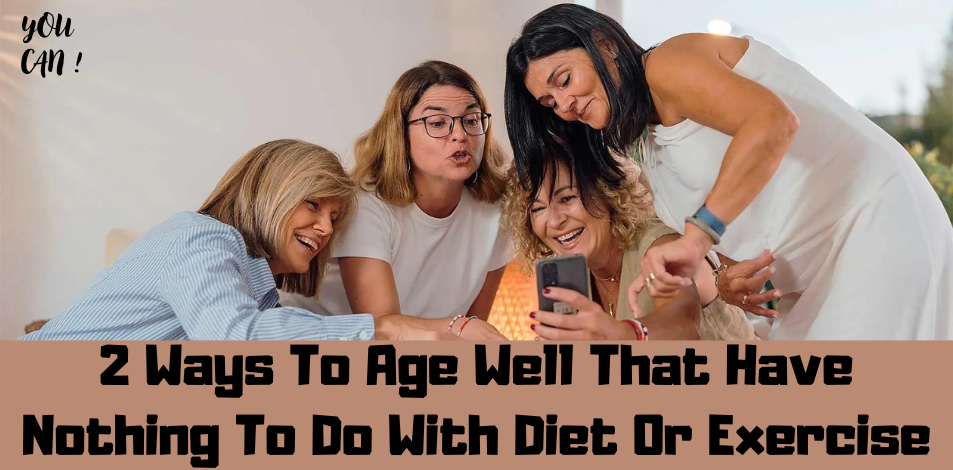
Wellness Starts with “We”—Especially for Women
“We tend to focus so much on individual wellness,” Chip Conley, founder of the Modern Elder Academy, told me. “But, interestingly, illness starts with “I,” and wellness starts with “we.” There’s a medical term for the social side of health; it’s called social fitness.
Conley shared another helpful way to think about it: “Community is a social safety net. We have property insurance for our home, but where is the emotional insurance for our rainy days?”
As we age, the need for stimulating social interactions and nurturing relationships becomes stronger, especially for women because we are more likely to live alone as we age. Once we reach age 65, women in the United States are twice as likely as men to live alone, either because they are widowed (due to superior longevity) or because they choose to live alone. In either case, this can make women more vulnerable than men to the negative effects of isolation and loneliness.
Quality > Quantity
However, you don’t have to be a social butterfly with hundreds of people in your circle. You also don’t have to have a large group of best friends. While quantity matters to some extent, the depth of our relationships is even more important.
“It’s good to have a good mix of strong and weak relationships,” explained Kelly Harding, a psychologist and associate professor of psychiatry at Columbia University Medical Center and author of The Rabbit Effect. That means the interactions you have when you go to A coffee shop, a grocery store, or say hello to your neighbor down the street are small bits of everyday connection that add up to something meaningful.
“I recommend to all of my patients that they be intentional about developing these relationships in all areas.”
Helen Dennis, a pioneer in the field of aging, a retirement coach, and a columnist for Successful Aging magazine, is in her 80s. She was widowed more than 20 years ago. When she talks about relationships, she does so as an expert and as a woman actively building her social network. She offers this advice:
“When it comes to relationships, I think it’s important at this late stage of life to learn to take the initiative. It takes practice because not everyone can take the initiative naturally.” Ultimately, she wants to try to have a variety of relationships.
Related : 3 Relationship Red Flags To Watch For This Holiday Season, From A Therapist
“A lot of studies on how the immune system works have shown that people who have a wider range of friendships do better,” Harding says. However, while virtual connections can be helpful, they can’t be everything.
“It’s important to share physical space with people,” Harding says, so you can read their body language and do what psychologists call co-regulation — or matching our moods and emotions to those around us, something we’ve probably been doing since childhood without even being aware of it.
Take a social inventory: Ask yourself, “Am I talking to people regularly during the day? Did I make time to connect with a loved one today?” If the answer is no to either of those questions, it’s time to get out, or if you’re housebound, invite people over.
It’s worth noting that if the people you’re connecting with don’t make you feel accepted, supported, or safe — or if their presence makes you feel stressed, judged, or unimportant — they’re toxic.
While every relationship has its ups and downs, if a relationship feels toxic, consider how you can protect yourself by talking about it, reducing your contact with that person, or ending the relationship altogether.
Kindness Boosts Social Fitness
Kindness is such a powerful health intervention that Harding says, “I wish I could prescribe kindness to all my patients because it’s one of those things where there’s no big harm and a huge potential gain.”
Exercising kindness reduces cortisol, blood pressure, and early death. And it doesn’t have to be a grand gesture or a lifetime of selfless service. Even small acts of kindness, or what Harding calls micro-kindness, can have an impact.
Those are things like making eye contact, smiling, reaching out to someone, offering a helping hand when you notice something, or stepping in when you see someone in a difficult situation. These small acts don’t just benefit you, they can have a ripple effect.
“Studies show that when you do a small act of kindness, it inspires the person receiving it to do something kind in return, and it also inspires everyone who witnesses the act of kindness to return it to others,” Harding says.
Best of all, it doesn’t cost anything to do and doesn’t take much time at all. I’ve added more detail about small acts of kindness in the Hacks section of this chapter so you can start incorporating them—and reaping the benefits—right away.




